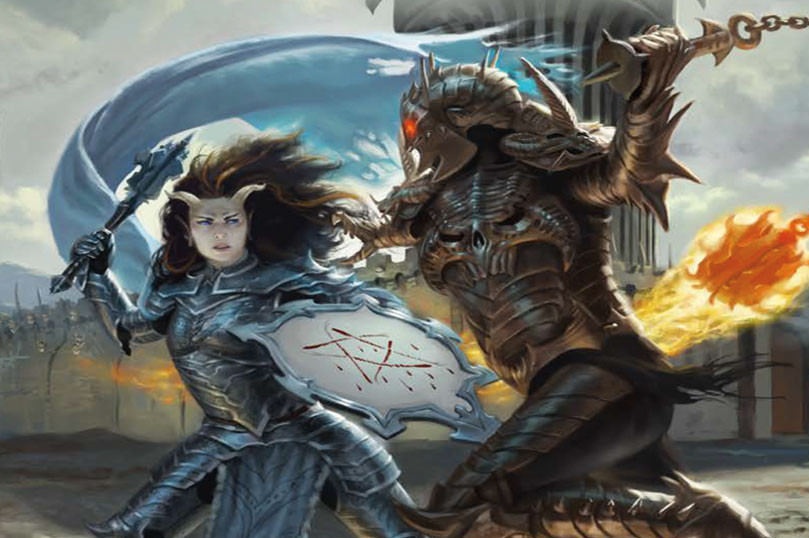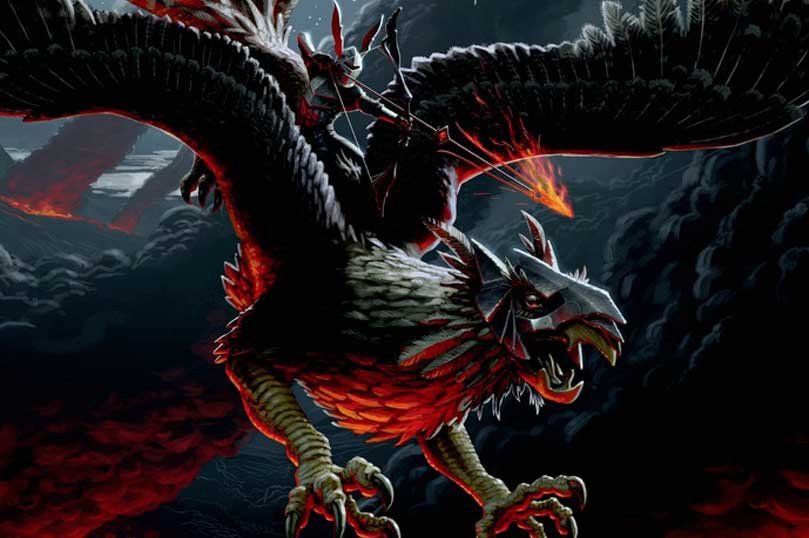opens in a new window The Hellknights are a brutal organization of warriors dedicated to maintaining law and order at any cost. For devil-blooded Jheraal, even the harshest methods are justified if it means building a better world for her daughter. Yet when a serial killer starts targeting hellspawn like Jheraal and her child, Jheraal has no choice but to use all her cunning and ruthlessness in order to defeat an ancient enemy to whom even death is no deterrent.
The Hellknights are a brutal organization of warriors dedicated to maintaining law and order at any cost. For devil-blooded Jheraal, even the harshest methods are justified if it means building a better world for her daughter. Yet when a serial killer starts targeting hellspawn like Jheraal and her child, Jheraal has no choice but to use all her cunning and ruthlessness in order to defeat an ancient enemy to whom even death is no deterrent.
Enjoy this sneak peek of opens in a new windowHellknight by opens in a new windowLiane Merciel!
1
THE SCHOLAR’S MURDER
JHERAAL
Birds cared nothing for murder.
Sweetly they sang from the branches of the fig and lemon trees that wreathed the grounds of Vaneo Celverian, the city manor of proud, ancient House Celverian. Under the elegant tile roofs and gilded balustrades, all might be in panic, but nothing disturbed the birds among their sun-dappled leaves. They sang and sang, bright as joy, while down below, mortal men and women struggled to grasp the enormity of loss.
They’d suffered a staggering one, Jheraal knew. Master Othando Celverian, second and favored son of Lord Abello Celverian, heir to his house and hope of his family’s future, had been murdered in the night. Others had been killed, too, but in Cheliax, only one of those deaths really mattered.
Out on the grand lawn, a semicircle of maids, grooms, cooks, and washerwomen in white and gold-slashed blue stood where they’d been turned out for her inspection. Every one of House Celverian’s servants was a picture of shock and grief. The younger maids held handkerchiefs to their tear-puffed eyes, while the older servants muttered about what they’d do when they found their master’s killer.
Both the sobbing and the plotting died abruptly when Jheraal rode into the servants’ view. One did not cry before Hellknights, and one certainly did not conspire to commit crimes. A sullen hush fell over the Celverian household as Jheraal’s chestnut destrier trotted across the graveled path, coming to a halt before the chief steward.
He was a tall man, spare and elegant and silver-haired, and although Jheraal was framed against the sun, he looked up into its full glare without blinking. “Sir?”
“I’m here to investigate the murders.” Jheraal removed her fearsome, devil-visaged helm, allowing the servants to see her face.
It caused a stir, as she had known it would. House Celverian’s people were well trained, and other than a gasp from one of the youngest grooms and a few tightened mouths and half-steps backward, none showed an overt reaction to her appearance. But Jheraal read their shock all the same.
The hellspawn taint ran strong in her. Jheraal’s skin was white as snow and covered with fine, soft scales, each one edged with a faint shimmer of copper. A pair of four-inch horns, curved and sharp as a goat’s, poked through her bronze-streaked black hair. They fitted into the hollows of the horns in her helm, and had indirectly served as inspiration for the same.
It was not unheard of for the devil-blooded to serve among the Hellknights, but neither was it common. In Cheliax, hellspawn were widely considered to be no part of proper society, and few of them received the training in arms or spellcraft needed to gain acceptance into the Hellknight orders’ ranks. Yet here she was, armored in the scarred breastplate and horned helm that marked her as a full Hellknight sworn to the Order of the Scourge.
The chief steward, a consummate professional, tipped his head downward in an extremely correct nod, affording Jheraal precisely the degree of courtesy that her status warranted. “It is our honor. Should we be expecting any of your associates?”
As he spoke, his eyes flicked to the star of bleeding lashes painted on Jheraal’s shield. That was the Scourge’s sigil, and the steward’s unspoken query was clear: Will the Order of the Rack be coming?
It was a delicate question. The Hellknight Order of the Rack, based in Citadel Rivad near Westcrown, was the primary order of Hellknights in the city. Jheraal’s order, the Scourge, was less well known and much less strongly represented, which was both advantage and disadvantage: it gave her greater independence, but fewer resources to call upon.
Less currency with the common people, too. As Westcrown had long been troubled by rumblings of dissent, Her Imperial Majestrix, Queen Abrogail Thrune II, had granted the Order of the Rack wide-sweeping authority to detain, question, and even execute suspected rebels in the city.
And although the Order of the Rack held the preservation of peace to be its highest duty, the methods it chose to achieve that duty were not always peaceful. In much of Westcrown, the order had a fearsome reputation. Few Wiscrani were glad to see them coming.
House Celverian, Jheraal recalled, might have more reason than most to be wary where the Order of the Rack was concerned. There had been some trouble with the eldest son, who’d gotten caught up in the idealistic fervor of the young. He hadn’t been accused of any serious wrongdoing, and his father’s influence had hushed any whiff of scandal, but nevertheless the boy had been sent packing to a crusader’s exile in Mendev.
That had been years ago. Well over a decade, in fact. But fear could take a long time dying, and Jheraal couldn’t blame the servants of House Celverian for being cautious.
“The Order of the Rack has no part in this investigation,” she said. Some of the servants relaxed visibly at her words. Out of long habit, Jheraal noted their faces, as well as those of the servants who didn’t blink at all. “The dottari will assist in whatever capacity they can, but they will not send a separate investigator. In this matter, I serve both the throne and my order. All of us wish to see your master’s killer brought to justice. You have my condolences for your loss.”
“We are grateful for your kindness. I have the honor of being Belvadio, chief steward of this house. Lord Abello Celverian should be arriving late tonight or early tomorrow. In the meantime, the household staff is at your disposal.” The chief steward clapped his hands, signaling the end of the assembly. In a flurry of curtseys and bows, the maids, cooks, and house servants dispersed. Jheraal dismounted, and one of the grooms led her horse away. Two servants, a pair of boys who looked no older than fourteen, remained behind at the steward’s signal.
“Achio and Tirol were the first to discover the … the … what had been done,” Belvadio said, clearing his throat. “They found Nappandi, one of our guards, lying in the hedges and came together to wake me a little after midnight. I hastened to wake the young master, and that is when we found him. Master Othando had been murdered in his study, where he was accustomed to read nearly until dawn. There are still two servants unaccounted for. We have not found their bodies, but I fear the worst.” The chief steward took a breath, quavering only slightly. “Where would you like to begin?”
“Show it to me as you found it.” Jheraal had no reason to doubt the steward’s honesty, but if there were any gaps in his story, she expected that it would be easiest to find them by walking alongside Belvadio and seeing whether the evidence matched his words.
“Of course. Please, this way.” With a courtly bow, Belvadio led his armored guest through the gardens’ fragrant shade toward the honeysuckle-threaded hedges that encircled the vaneo. Overhead, the birds continued their merry, oblivious song.
Although House Celverian’s main seat lay in the hinterlands, and its manor in Westcrown was not as grand or expansive as the sprawling estates called vira, it took several minutes for them to reach the bloodstained spot by the walls where Nappandi’s body had been found.
There wasn’t much blood. Only a few brownish drops, already mostly soaked into the earth, and a patch of crushed clover near the base of the hedges where the body had lain. In the darkness, screened by the dense thorned shrubs, it might have been a long time before anyone noticed a body at night.
Jheraal crouched and looked for tracks that might have been left by the killer, but found none. Either Nappandi’s assailant had known how to hide them, or the servants had already trampled out those traces.
She straightened with a clanking of steel and leather. “Your guard kept a regular patrol?”
“Yes. Every hour on the hour. Nappandi was extremely diligent. He would never have missed a round, nor been a minute late on his circuit.”
Predictable, then. Easily evaded. The lack of struggle suggested that the killer had never been seen. He could have slipped by if he’d wanted, but instead he’d chosen to kill the guard.
“Was anything taken from his body?” Jheraal asked.
“Yes. A ring of keys. Nappandi had keys to most of the vaneo, other than the master’s private rooms and the wine cellar. That was the only thing I could see that was stolen. Do you wish to examine the body?”
“Later. Show me where you went and what you did after you found him.”
Belvadio glanced at the two boys behind him. They hung back nervously while Jheraal examined the blood-speckled grass. “After Achio and Tirol told me what they’d found, and I had confirmed with my own eyes that this was no prank, we went together to inform the master. I also sent word to the captain of our household guard that there was a murderer at large in the vaneo.”
“How many guards do you have?”
“Four.” The steward grimaced, shaking his head. “Three, with Nappandi dead. But none of the others saw whoever did this.”
Jheraal nodded. Three household guards were unlikely, in her estimation, to present much difficulty for someone who could kill one of their number so easily and silently. That they had seen nothing meant little. There was no need to insult their honor by saying so, however. “Show me to Master Celverian’s study.”
“At once.” With another neat bow, Belvadio strode toward the manor, the two younger servants trailing him like puppies. A few steps from the servants’ door, he hesitated. “Do you wish to follow precisely the same path we took? These halls are … not grand enough for guests, I fear. I would not wish to cause any insult.”
He is worried about offending the Hellknights. Belvadio’s concern about ushering her through the servants’ door might have been reasonable if he’d been dealing with the touchiest of high Chelish lords, but she had no illusions that a steward who’d spent his entire life in service to a great house really believed that her rank was so exalted, or her skin so thin. This was caution and nothing but.
Jheraal snorted. “I’m not a duchess, Belvadio. I won’t be insulted by walking through the service door. Just show me where you went.”
“Forgive my presumption.” Producing a ring of keys from some unseen pocket inside his blue coat, Belvadio unlocked the door and stepped aside to hold it open. “The young master’s library will be up the stairs and to the right.”
“Lead on.”
He took her past the larder and buttery, through the kitchens, and up a flight of well-worn wooden stairs. No footprints stood out here, either.
At the top of the stairs, they reached the discreet little door that separated the servants’ quarters from the nobles’ halls. Quilted padding covered the servants’ side of the door, insulating their superiors from any unwanted noise or smell that might drift up from the kitchens. The other side of the door, Jheraal noted, was painted white and adorned with gilded scrollwork. All the unsightliness—and all the function—was on the servants’ side.
Although the servants’ halls had been lit only by the daylight that streamed through their small, cloudy windows, enchanted lights shone serenely along the ceiling and upper walls of this corridor. Wide picture windows overlooked the manor’s gardens, while carpets in faded blue and white sank under Jheraal’s booted feet. The carpets were lush at the periphery but worn in the centers. That they hadn’t been replaced suggested that House Celverian wasn’t as rich as it had been in years past. No surprise. Failing fortunes were common among the old nobility that had declined to align strongly enough with House Thrune.
Nevertheless, it was lovely. The airy beauty of the upper hall was marred only by the faint whiff of blood that grew stronger as they approached an open door on the right.
“In there,” Belvadio whispered. The color had drained from his face.
They hadn’t moved the body. The mortal remains of Othando Celverian remained in the overstuffed armchair where he had presumably died. A linen sheet covered his slumped form imperfectly, trailing over part of the desk in front of him. A carafe and half-full wineglass rested on a silver tray near his elbow. Papers spilled across the floor by his side, along with a fallen candle stub trailing a comet’s tail of wax spatters.
Jheraal stepped forward to examine him, taking care not to disturb the papers. “This is all as you found it?”
“Almost. There was … a cleric came before you. Udeno of Abadar. He looked over the master and said there was nothing he could do. Other than his examination, and the sheet I placed over the master, nothing has been touched.”
The Hellknight nodded without looking up. With as much delicacy as she could muster, she lifted the sheet that covered Othando Celverian.
He had been a young man. Twenty-five, she guessed. Maybe a year or two to either side. Slim, handsome, with the soft hands and pale skin of a scholar who spent little time outdoors. Drying blood spilled from a single deep puncture wound on the side of his neck and darkened his sleeping robe in a crooked fan that widened as it stretched toward the floor. More blood painted the carpet behind him and to the side, and a single brownish-red fingerprint smudged his right arm near the elbow.
Othando’s own hands were clean. That bloody fingerprint had come from someone else.
His face was buried in the pages of the book he’d been reading. When Jheraal lifted Othando’s head, she saw that his eyes were wide and his lips slightly parted. The breeze from an open window fluttered dark blond hair across his brow. She couldn’t tell if he had been talking, trying to cry out, or just gasping for breath in his last extremity, but it seemed that he’d been looking at someone when he died. The spill of blood from his wound suggested that he had turned toward, and then away from, something or someone at his back.
The killer? It was tempting to conclude that Othando must have seen his assassin. If he had, his shade might answer a cleric’s prayer and identify his attacker.
Jheraal had been an investigator long enough to know that such hopes almost always proved futile. Something as simple as a mask or hood sufficed to prevent recognition, as every professional killer knew, and the dead were blessed with no more knowledge than they’d had in life. The Hellknight had worked on dozens of murders in the twelve years of her investigative career, all across Cheliax and its vassal states, and never once had she seen the spirit of an assassin’s victim able to identify his killer. Amateurs might be named by the dead. Professionals never were.
That didn’t mean she had no use for magic. Only that its use had to be less easily anticipated by her target.
She glanced at the open book. Drying blood gummed its pages and darkened the illustrations, but the lettering remained clear. It looked to be a collection of Taldan heroic stories—disgraced knights winning back the honor of tarnished houses, second sons and valiant daughters carving names for themselves in savage lands, heroes who vanquished monsters and won the love of their people. Tales to stir excitement into a quiet life.
The letters that had blown onto the floor appeared to be correspondence: invitations to various social events from other Wiscrani nobility, orders from his lord father at the family estate, and an unfinished letter from Othando himself to his exiled brother in Mendev.
Drawing the sheet back over the body, Jheraal stepped sideways to examine the desk. Two of the drawers were partly opened. One held signets in gold and bronze, sticks of sealing wax, unsharpened quills, a paring knife, and a wrinkled paper sachet of sugar-rolled mints. The other was empty save for a few faded stains at the bottom. The remaining drawers were locked.
She motioned to the desk. “Was anything taken from here? Or from Master Celverian himself?”
“I cannot be certain,” Belvadio admitted. “The master’s study was private. I did not notice anything stolen, but some small theft might have escaped my notice.”
“How busy would the household have been at that hour?”
The steward took a moment to think it over. “We had no guests at the vaneo, and no entertaining planned for the next few days. Other than one or two of the under-cooks in the kitchen and the guards making their rounds, everyone should have been sleeping. Achio and Tirol were out only because they were making mischief.”
“Was it Master Celverian’s custom to leave that window open?” Jheraal gestured to the skylight, although she already knew the answer. That window was too high to be opened without the aid of a ladder, and she had seen none in the study.
Belvadio frowned, confirming her guess. “Pleasant as the weather is, no. The master was concerned that nothing should damage his books—not rain or sun or snow. The window was only to admit light to assist his reading. He never opened it.”
“You said there were two other servants missing?”
“Chiella and Nodero.” The steward fidgeted with a button, then caught himself and stopped, smoothing his coat. “Chiella was here when I sounded the alarm. I saw her with my own eyes. No one recalls seeing Nodero after he retired to his room last night. Both were gone by the time I found the master, or soon after.”
“Do you believe they might have played some role in this?”
Belvadio shook his head vehemently. “Impossible. No one loved House Celverian more than Nodero and Chiella. Their loyalty is beyond question.”
“You’re sure of that? How?”
The silver-haired man exhaled. With a quick, uncomfortable glance at Jheraal, he said: “House Celverian has always been adamant that everyone in its service is to be dealt with fairly, as fits each person’s talents and disposition, and that no one is to be slighted on account of their ancestry.” Belvadio’s eyes flickered to the carpet, avoiding her, on the word “ancestry.”
The missing servants were hellspawn, then. No other reason for that discomfort. And not everyone on the staff was as accepting as their master had been, judging from the reception she’d gotten on the lawn.
“Those who offend this policy are dismissed without references, which is a death sentence for employment among the great houses. The young master, like his father, was an uncommonly enlightened man, and he was fiercely beloved by all who had the good fortune to serve him. It is inconceivable that either Chiella or Nodero would ever have done anything to hurt him, or to damage the honor of his house.”
“As you say.” It sounded like burnishing the virtues of the dead to her, but perhaps Othando Celverian really had been a saint among men. “I’ll visit the church of Abadar to speak with the cleric who examined Master Celverian, and then return to the Order of the Rack’s garrison. Please send word when his father, Lord Celverian, arrives in Westcrown.”
“Of course.” He followed her back out of the manor, keeping always two paces behind and a half-step to the side, like the most discreet of ghosts. As they reached the servants’ door, however, the steward took a small step forward.
“Truly,” he said, dropping his reserve for a moment and letting her see the real anguish beneath, “I don’t believe Chiella or Nodero could have had any part in this horror, let alone both of them together. Never. In my bones, I know they are innocent. But I do believe someone might try to use them to discredit their kind. Not everyone approved of the master’s views on hellspawn, and some of the servants I was forced to dismiss might seek revenge for their disgrace.”
No servant could afford to hire an assassin with that much skill. They might have aided in the killer’s plots, but they couldn’t have been the driving force. “Did he have enemies among the nobility?”
“The young master? No. He was being courted by some of the lesser houses with marriageable daughters, but as yet he had chosen none, so no one had reason to be insulted by his refusal. He had no position at court and no place in political schemes, and his hobbies were harmless. Master Celverian was a dreamer and a scholar. He was no threat to anyone.”
“What about the rest of his house?”
Belvadio opened the door. Outside, the sun was a glory and the birds were singing, and Westcrown’s life went on. Even within the vaneo’s walls, the rhythms of the day were returning. A washerwoman pinned damp sheets to her lines. Across the yard, a stocky, freckle-faced boy carted muck from the stables. Already, the night was beginning to recede in their memories.
“Their mistakes are in the past,” the steward said, returning Jheraal to the city.
The cleric of Abadar had little to tell her. Yes, he had gone to the vaneo that morning. Yes, he had seen Master Celverian’s corpse. No, he had no suspicions regarding how the murder might have been carried out, nor about who would have had a motive to strike at House Celverian’s younger son.
“It’s what they do, isn’t it?” Udeno shrugged. “The courts are snake pits. No surprise when one gets bitten by a viper.”
Jheraal hadn’t argued, but as she walked down the temple’s steps back into the canal-lined streets of Westcrown’s Rego Sacero, she’d thought, Not like this.
It was true that the Chelish nobility spent an inordinate amount of time plotting against each other, and that espionage and assassination were well-used weapons in their arsenals. But it was also true that blatant, barefaced murder was considered extremely bad form.
Cheliax prided itself on being a nation governed by law. Its killers might disguise their doings as hunting accidents, food poisoning, or highway robberies gone wrong. The more cunning and ambitious might even go so far as to trump up criminal charges and let the royal executioners take their enemies’ heads.
But they did disguise their murders, because otherwise they invited the full wrath that Cheliax visited upon all those who broke its laws.
The assassination of a well-born scholar in his study was precisely the sort of crime that offended Her Imperial Majestrix and insulted her rule. That it had happened in Westcrown, which chafed at its loss of prominence under House Thrune and needed little provocation to stoke its smoldering discontents into new flame, made the investigation more urgent. And that the victim had been an eligible young bachelor who was actively courted by several Wiscrani houses added an edge of intrigue. Jheraal guessed that there were several furious dowagers who were eager to learn which of their rivals might have destroyed their daughters’ prospects.
For all these reasons, it was exceedingly important that she find the killer.
No one had said this, of course. Not explicitly. The mere fact of her assignment made it clear enough. Jheraal was of the Order of the Scourge, and she had been chosen to investigate a crime in a city where the Order of the Rack held sway. There were any number of messages bound up in that, but the key one was that Her Imperial Majestrix expected results. Failure was not to be countenanced. That was why Jheraal, of all the investigators available to the Hellknights, had been singled out and sent to serve. The Queen wanted answers, and Jheraal was meant to find them.
The obvious course was to question Lord Celverian. But the lord hadn’t yet arrived in Westcrown, so Jheraal returned to Taranik House, the Order of the Rack’s base of operations in the city, to see whether any messages had come.
There was one. The courier, a towheaded halfling boy, was standing in the foyer and filling his satchel with new missives when Jheraal arrived. He dropped the packet he was holding and waved excitedly when he saw her. “Jheraal! Hellknight Jheraal!”
Jheraal raised a hand to calm him. “What?”
“I have a message of utmost urgency. Utmost! From Durotas Tuornos. His rundottari found bodies in Rego Cader. Two from House Celverian. The durotas said you’d want to know immediately. Here—he wrote this for you, but it only says the same thing.” The boy held out a folded slip. It had been hastily written. The ink soaked through the cheap paper.
“He was correct.” The Hellknight took the letter, gave it a cursory look, and put her horned helm back on. Rego Cader, the long-abandoned Dead Sector of the city, was infamously perilous, full of thieves and murderers and worse. Even the dottari, Westcrown’s city guard, didn’t like to linger in those blighted ruins. Rego Cader was so dangerous that it had its own division of the guard—the rundottari, or “ruin wardens”—dedicated exclusively to holding back the threats that proliferated in that sector. “Bodies, you said. Where, exactly? Are they still there?”
“I don’t know.” The halfling said, fumbling to pick up the packet he’d dropped, “but Durotas Tuornos is on the Obrigan Gate. He hoped that you would hurry. He hoped, also, that you would send word to the capital. For a wizard.”
“Why? Aren’t there enough wizards in Westcrown?”
“I don’t know.” The boy shook his head in helpless confusion. He closed his overstuffed bag and went to the door. “The durotas didn’t tell me, not really. All he said was that there was magic in this. Deviltry. And …” he swallowed, “and that the dead might not be dead.”
Copyright © 2016 by Liane Merciel
Hellknight comes out April 5th. Pre-order it today: opens in a new windowAmazon | opens in a new windowBarnes & Noble | opens in a new windowBooks-a-Million | opens in a new windowiBooks | opens in a new windowIndiebound | opens in a new windowPowell’s
 No one knows where the Tufa came from, or how they ended up in the Smoky Mountains of East Tennessee. Enigmatic and suspicious of outsiders, the Tufa live quiet lives in the hills and valleys of Cloud County. While their origins may be a mystery, there are hints of their true nature buried in the songs they have passed down for generations.
No one knows where the Tufa came from, or how they ended up in the Smoky Mountains of East Tennessee. Enigmatic and suspicious of outsiders, the Tufa live quiet lives in the hills and valleys of Cloud County. While their origins may be a mystery, there are hints of their true nature buried in the songs they have passed down for generations. Esslemont’s epic fantasy series begins with the story of the night of the Shadow Moon, when the good people of Malaz are threatened with demon hounds and other, darker things. It was also prophesied that this night would witness the return of Emperor Kellanved, and there are those prepared to do anything to prevent this from happening…
Esslemont’s epic fantasy series begins with the story of the night of the Shadow Moon, when the good people of Malaz are threatened with demon hounds and other, darker things. It was also prophesied that this night would witness the return of Emperor Kellanved, and there are those prepared to do anything to prevent this from happening… The dangerous Raj Ahten of Indhopal has taken so many attributes, he’s all but invincible. He can heal almost instantly from any wound, is faster than an arrow, is stronger than any ten men, and is gifted with godlike beauty. And now a young prince must stand up against this invincible foe to rescue the woman he loves and the land that he is sworn to protect.
The dangerous Raj Ahten of Indhopal has taken so many attributes, he’s all but invincible. He can heal almost instantly from any wound, is faster than an arrow, is stronger than any ten men, and is gifted with godlike beauty. And now a young prince must stand up against this invincible foe to rescue the woman he loves and the land that he is sworn to protect. Essential for any fan of Dragon Age, the books expand the fantastic world of Thedas. Whether you want to learn more about the kings and queens of Ferelden, the court intrigue of Orlais, or do a deep dive into the enigmatic history of the Grey Wardens, there is a book for you.
Essential for any fan of Dragon Age, the books expand the fantastic world of Thedas. Whether you want to learn more about the kings and queens of Ferelden, the court intrigue of Orlais, or do a deep dive into the enigmatic history of the Grey Wardens, there is a book for you.













